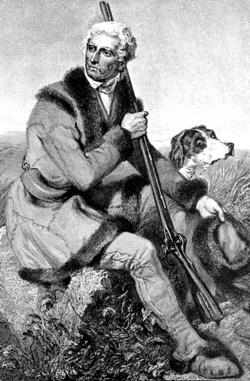 Daniel Boone, one of the most famous longhunters, on the early American frontier | |
| Occupation | |
|---|---|
| Names | Longhunter, long hunter |
| Description | |
| Competencies | Trapping, hunting, fishing, skinning, marksmanship, self-defense, trading, canoeing, horsemanship, tracking, exploring, mental and physical toughness, wilderness survival skills, folk medicine, frontier doctoring, diplomacy, English, French, Spanish, and Native American languages |
Related jobs | Coureur des bois, Mountain man |

A longhunter (or long hunter) was an 18th-century explorer and hunter who made expeditions into the American frontier for as much as six months at a time.
While historian Emory Hamilton says that "The Long Hunter was peculiar to Southwest Virginia only...", many also hailed from North Carolina's western piedmont. [1] The term has also been used loosely to describe any unofficial European American explorer of the period. Many long hunts started in the Holston River Valley near Chilhowie, Virginia. Parties of men usually started their hunts in October and ended toward the end of March or early in April, going west into the territory of present-day Kentucky and Tennessee. These were the hunting grounds of the Cherokee and Shawnee people.[1]
The longhunters gathered information about the western lands in the 1760s and early 1770s that would prove critical to early European American settlement in Tennessee and Kentucky. Many longhunters were employed by land surveyors seeking to claim new lands ceded to the British by the French in the Ohio River Valley following France's defeat in the Seven Years' War. Some later helped guide settlers to what became Middle Tennessee and southeastern Kentucky.